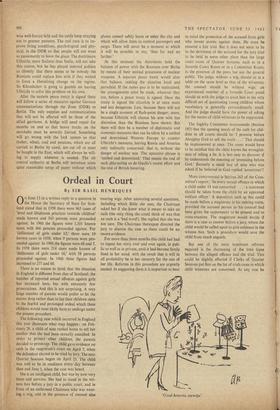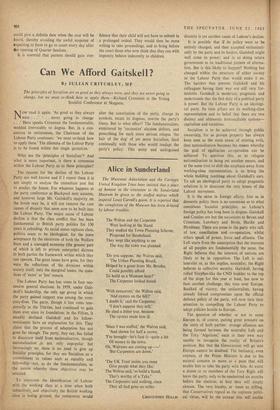Ordeal in Court
By SIR BASIL HENRIQUES N June 13 in a written reply to a question in the House the Secretary of State for Scot- land stated that in 1958 there were 963 cases of 'lewd and libidinous practices towards children' made known and 345 persons were proceeded against. In 1960 the figures were 1,301 known cases with 466 persons proceeded against. For 'defilement of girls under 13,' there were 19 known cases in 1958, when 9 persons were pro- ceeded against, In 1960 the figures were 68 and 7. In 1958 there were 214 cases made known of 'defilement of girls under 16,' with 58 persons proceeded against. In 1960 these figures had increased to 277 and 60.
There is no reason to think that the situation in England is different from that of Scotland; the number of reported sexual offences against girls has increased here, but with extremely few prosecutions. And this is not surprising. A very large number of parents would prefer to let the matter drop rather than to lay their children open to the fearful and prolonged ordeal which these children would most likely have to undergo under the present procedure.
The following case which occurred in England this year illustrates what may happen: on Feb- ruary 26, a child of nine rushed home to tell her mother that she had been sexually assaulted. In order to protect other children, the parents decided to prosecute. The child gave evidence on oath in the magistrate's court on April 7, when the defendant elected to be tried by jury. The next Quarter Sessions began on April 25. The child was told to be in readiness every day between then and June 1, when the case was heard.
She is an intelligent child, but was by now very tense and nervous. She had to stand in the wit- ness box before a jury in a public court, and in front of an enthroned Chairman who was wear- ing a wig, and in the presence of counsel also wearing wigs. After answering several questions, including which Bible she uses, the Chairman asked her if she knew what it meant to take an oath (the only thing she could think of was that an oath is a 'bad word'). She replied that she was not sure. The Chairman thereupon directed the jury to dismiss the case as there could be no sworn evidence.
For more than three months this child had had to repeat her story over and over again, in pub- lic as well as in private, until it had become firmly fixed in her mind with the result that it will in all probability be in her memory for the rest of her life. Reforms in this procedure are urgently needed. In suggesting them it is important to bear in mind the protection of the accused from girls who invent stories against them. He must be ensured a fair trial. But it does not seem to be to the detriment of the accused for the jury trial to be held in some other place than the large court room of Quarter Sessions. such as in a Juvenile Court Room or in a Committee Room, in the presence of the press but not the general public. The judge, without a wig. should sit at a table on the same level as that of the witnesses; the counsel should be without wigs; an experienced member of a Juvenile Court panel should sit with the judge to assist him in the very difficult art of questioning young children whose vocabulary is generally extraordinarily small. And the judge should have the power of asking for the names of child witnesses to be suppressed.
The Ingleby Committee recommends (Section 197) that the opening words of the oath for chil- dren in all courts should be 'I promise before Almighty God to tell the truth ....' This should be implemented at once. The court would have to be satisfied that the child knows the wrongful- ness of telling a lie. It is less easy to discover if he understands the meaning of 'promising before God.' Recently a small boy of nine who was asked if he believed in God replied `sometimes'!
More controversial is Section 262 of the Com- mittee's report : 'In every sexual offence in which a child under 14 was concerned a statement should be taken from the child by an approved welfare officer.' A deposition such as this could be made before a magistrate in his retiring room, provided the accused person or his counsel had been given the opportunity to be present and to cross-examine. The magistrate would decide if there is a case to answer before a jury, where the child would be called upon to give evidence in the witness box. Such a procedure would save the child from much anguish.
But one of the most important reforms required is the shortening of the time lapse between the alleged offence and the trial. This could be slightly effected if Clerks of Quarter Sessions put first on the list of trials cases in which child witnesses are concerned. At any rate he could give a definite date when the case will be heard, thereby avoiding the awful suspense of expecting to have to go to court every day after the opening of Quarter Sessions.
It is essential that parents should gain con- fidence that their child will not have to submit to a prolonged ordeal. They would then be more willing to take proceedings, and to bring before the court those who now think that they can with impunity behave indecently to children.



































 Previous page
Previous page